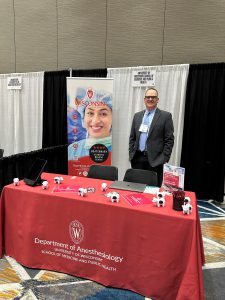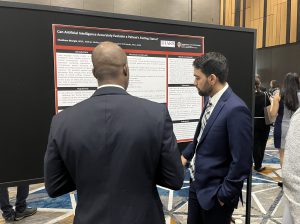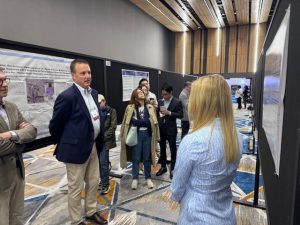
The Department of Anesthesiology made a significant impact at the International Anesthesia Research Society (IARS) and Society of Critical Care Anesthesiologists (SOCCA) 2024 annual meeting in Seattle, Washington, on May 17–19, 2024. From engaging with attendees to presenting groundbreaking research, the department showcased its commitment to advancing patient care and anesthesia practice.
Booth Presence and Recruitment
At booth #20, Dr. Joshua Sebranek, associate professor of Anesthesiology at the School of Medicine and Public Health (SMPH), welcomed attendees. He fielded questions about open positions, including the Vice Chair of Clinical Affairs role. Dr. Martha Wynn, the current Vice Chair, will retire at the end of May, necessitating a robust search. In the interim, Dr. Timothy McCormick, associate professor of Anesthesiology SMPH, will step into this critical position.
Posters: AI and Patient Care

Faculty and two Clinical Anesthesia-1 residents presented posters that captured the conference’s spirit of innovation:
-
-
- “Interleukin 6, Soluble IL-6 receptor, and Their Binary Complex are Associated with Postoperative Delirium”
- Presented by Dr. Richard Lennertz, assistant professor of Anesthesiology at SMPH. Delirium is associated with increased morbidity and mortality, and the inflammatory response to surgery is thought to drive the development of postoperative delirium in vulnerable patients. The study suggests that IL-6 trans-signaling, facilitated by a leaky blood-brain barrier, is a mechanism by which inflammation in the body causes inflammation in the brain.
- “Can Artificial Intelligence Accurately Evaluate a Patient’s Fasting Status?”
- Presented by Dr. Shubham Mangla, this poster delved into how AI disrupts the perioperative space. Can algorithms accurately assess fasting status? The implications for patient care are immense.
- “Rate-Dependent Pseudoelectrical Alternans During Laparoscopic Hysterectomy”
- Lenka Craigova’s poster highlighted the impact of anesthesia care on patient outcomes. Understanding rate-dependent pseudoelectrical alternans during surgery can lead to better patient outcomes.

Dr. Lenka Craigova presents her poster as SOCCA president Dr. Michael Wall moderates the session at the SOCCA 2024 annual meeting.
- Lenka Craigova’s poster highlighted the impact of anesthesia care on patient outcomes. Understanding rate-dependent pseudoelectrical alternans during surgery can lead to better patient outcomes.
- “Interleukin 6, Soluble IL-6 receptor, and Their Binary Complex are Associated with Postoperative Delirium”
-
Clinical Practice Committee and Workgroups
Dr. Gozde Demiralp, assistant professor of anesthesiology at SMPH, assumed the role of chair for SOCCA’s Clinical Practice Committee (2024–2026). This committee, comprising 56 volunteers, focuses on critical care areas such as ECMO/MCD/CTICU, Global Critical Care Medicine, Transplant Critical Care, Physiologically Difficult Airway, Neuro Critical Care, and OB Critical Care. Dr. Demiralp presented the committee’s activities during a spotlight session, emphasizing collaboration and innovation.
Mentoring and Impact

Dr. Kristopher Schroeder, assistant professor of Anesthesiology SMPH, played a pivotal role in mentoring early-stage anesthesiology scholars (eSAS). The program, designed for emerging scholars, provided career advice, skill sharpening, and networking opportunities. Dr. Schroeder believes that meaningful collaborations emerged from these interactions, bridging early-career faculty with established physician scientists.
Addressing the Opioid Crisis
Dr. Carrie Schroeder, from the University of Wisconsin School of Veterinary Medicine, delivered a thought-provoking presentation titled “Tranq Dope and Elephant Tranquilizers: Veterinary Anesthetics in Human Medicine.” The session explored ultrapotent opioids and alpha-2 agonists, their impact on patient health, and pathways for physicians to influence community well-being through education and advocacy.
The Department of Anesthesiology’s active participation and dedication to advancing anesthesia practice and critical care were evident throughout the conference. As we look forward to next year’s annual meetings in Honolulu, Hawaii, we celebrate the impact of research, collaboration, and compassionate patient care.